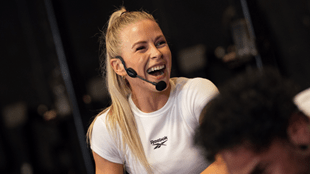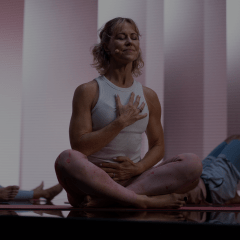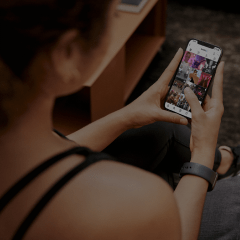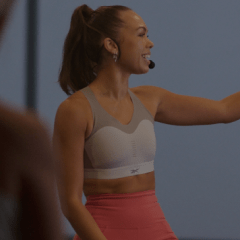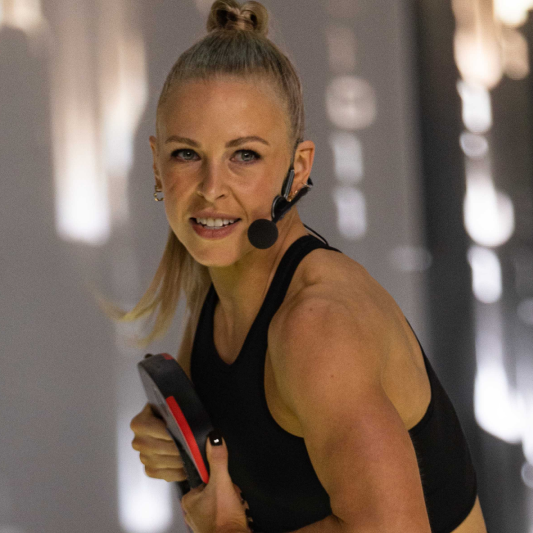
Erin Maw: sleep and saunas
I'm an active relaxer, so I like to move my body every day. I don’t always do an intense workout, but I do exercise every day. A recovery day for me looks like an 8K flush run or a steady state cycle class.
My top three recovery methods are taking infrared saunas, Epsom salt baths and magnesium supplements.
Sleep is SO important! I try to get 7 – 9 hours. Because I'm up early, I'm also in bed early – always before 10pm because this is where I get my longest 'deep sleep' duration. I'm also very mindful with what I put into my body, good foods that help me recover, lots of veg and protein.
I'm also pro-napping; some days my body will give me a signal and I'll hit a quick power nap to boost my physical and mental functionality. I also work with a running coach who keeps an eye on my weekly load and what my heart rate is showing him. He'll modify my own training (runs) based on what he's seeing from my other workout training stats.
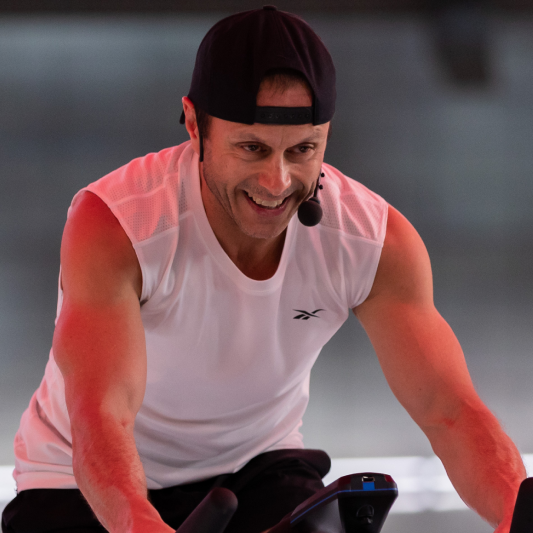
Glen Ostergaard: lower intensity workouts
As I’ve gotten older I’ve learned how to manage my intensity. For me right now the sweet spot is having about 20 percent of my workouts at high intensity, and the remaining 80 percent at a lower, more steady state intensity – things like riding my bike or running.
I have one day off a week and I usually do nothing on this rest day. As my Dad used to say: “Why stand when you can sit?” I grew up on a farm and so we were always working hard. When you get the opportunity to rest, you take it!
I eat whatever I want – I’m not on a specific diet – and I sleep as much as I can. I normally use my massage gun for about 20 – 30 minutes every day, and I also stretch most days.
I try to take it easy after filming rounds because that’s when I’m at most risk of getting injured. I’ve started doing Pilates and that helps me to be more mindful, as well as strengthening my entire body.
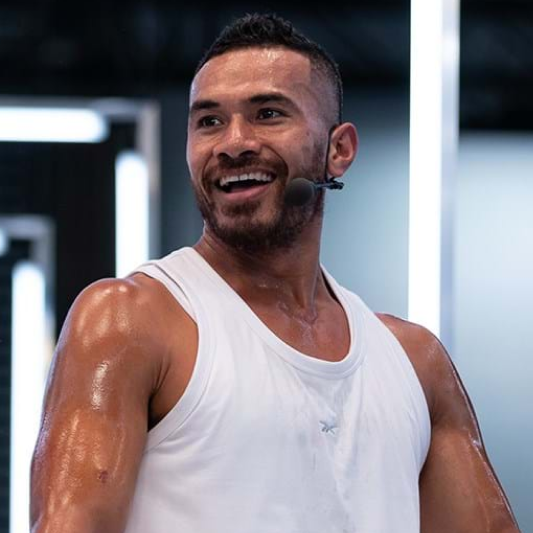
Des Helu: the right nutrition
I think it can be hard as fitness enthusiasts to step back sometimes, because we love what we do, but being able to recognize the work and toll that our jobs put on our bodies is super important. To avoid burnout, I listen to my body, acknowledge when it's had enough and give myself time to recover.
I have two rest days a week – Saturday and Sunday. On my rest days I often get a nap in and if I'm playing with my kids, I'll try to sit on the floor so I'm also stretching and mobilizing. I also EAT a lot! Food plays a big part in my recovery, so I make sure I get enough nutrients to support my training. Foam rollers are also my best friend, as well as my massage gun.
I’m a personal trainer, and my advice to my clients is to monitor their protein consumption and ensure it's enough to support their output. I tell them to listen to their bodies, even (especially!) if that means taking a day away from the gym. And create balance in their lives. Rest, eat well, move when it feels good.
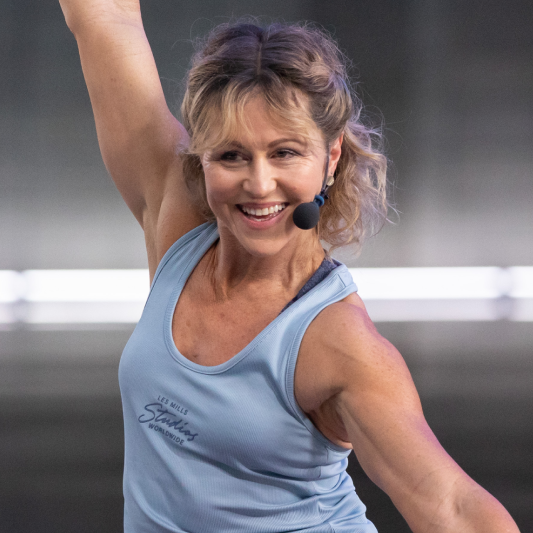
Kylie Gates: self-care first
I always have one rest day a week – normally Sunday.
To aid my recovery, I have a massage every fortnight. I love using my massage gun and I also have infrared saunas. I find that walking is a great form of recovery that helps when I’m feeling stiff.
I do track my HRV [Heart Rate Variability] on my fitness watch, and when it’s not optimal I know all the things to improve it. I don’t stop training, but I will look at my sleep and nutrition. For me this means not eating late at night, not consuming alcohol (I don’t drink much anyway). I try to eat at least three hours before I go to bed. Meditation is also key.
If I start to feel burned out, I look at my schedule. I used to just suck it up, but now I look at my week and ask: “What can I drop?” I’m never going to drop my self-care – that has to come first so I can do everything else well. It comes down to good scheduling and having balance. My rituals give me the ability to function at a high level and if I don’t have them, then I know I won’t be able to perform the way I want to.

Gandalf Archer Mills: warm-up before teaching
How do I recover? For me, every day is different. My body is always up or down in different ways in different places. Today, my quads are smashed from what I’ve done this week, so I’ve got today’s approach. How’s that for a useless answer?!
In general, I:
- Stretch constantly: hips, quads, calves, glutes, lower back, traps…
- Foam roller my ITBs, calves, Achilles (been big on this lately). My calves used to hurt just from touching; now I can put my whole body weight on them, on a foam roller, and the muscle has the required elasticity so I’m not screaming in pain. Which is nice.
- Have big proper warmups before teaching; I never hit the stage from zero.
When it comes to burn out… I can feel when I’m in it. I’ll still teach my classes, but just spend more time stretching and chilling.
I guess my biggest thing is I’m always in touch with and connected to how my body is feeling. I pay attention to it so I can maintain the daily level of output that’s required.
Learn why Gandalf loves sobriety
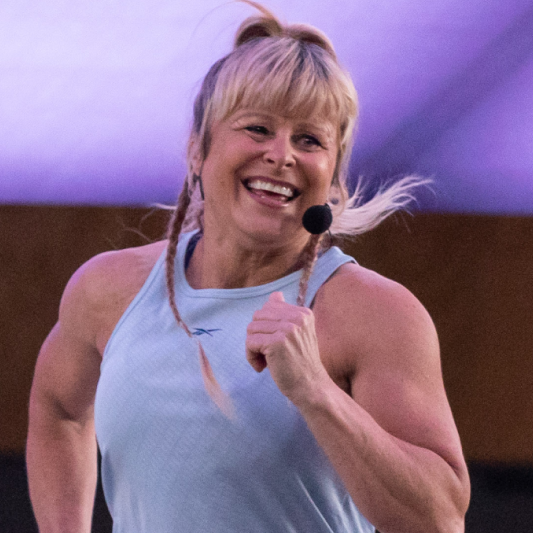
Lisa Osborne: time with my family
Rest and recovery doesn’t have to be a day of sitting on the couch… for me it means reducing my heart rate but keeping moving! Things like walking that don’t place stress on the mind or body are great. It’s also about not adding extra training on top of what’s manageable.
I have two rest days a week – usually one mid-week and on Sunday. On those days I will do a light run or swim, and I also like to do a Trainer Series Flexibility Workout on LES MILLS+! I don’t track my HRV, but I do base my recovery on feel and the amount of sweat and breathlessness.
To avoid burnout, I will take a few days away from my place of exercise – go away with the family and refresh that way. Playing and walking with my family are my recovery. I think it’s important to lock in a training schedule that works for your goals, and not add anything extra in. That way you can set your expectations and then plan in rest time as part of the program.
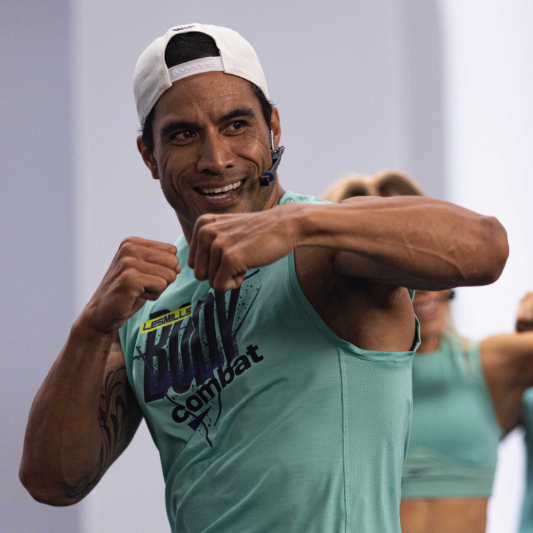
Vili Fifita: mental time out
For me, recovery is about mental recovery. From a physical perspective, I can go and go and go. My body never feels like it needs a rest. However, my mind is always active and, especially when I’m filming multiple programs for Masterclass, it’s easy to get overwhelmed with all of the choreography and scripting and the pressure to perform. So, I look for ways to clear my mind.
The way I handle this is by doing massive road cycles – I did 50K the other day – with no music. Or long runs or walks. I like to move in silence, and just look around at nature. I also stretch a lot – again, in silence.
At home, I’ll turn my phone off and just write until my mind feels empty – just with a pen and paper. I’ll keep going until I’ve got nothing left. I also love just hanging out with our two cats. The cats are like a recovery pill for me! They make my brain feel rejuvenated. I’ll take them outside and they show me what life is about.
I used to be an extrovert, but the last few years have really changed me. The pandemic really put the nail in the coffin for my going fully-blown introvert! Now, I need time by myself – in silence – to recover. I need time to myself to be able to give to others; I fill my cup first so I can help others by being the best version of myself.
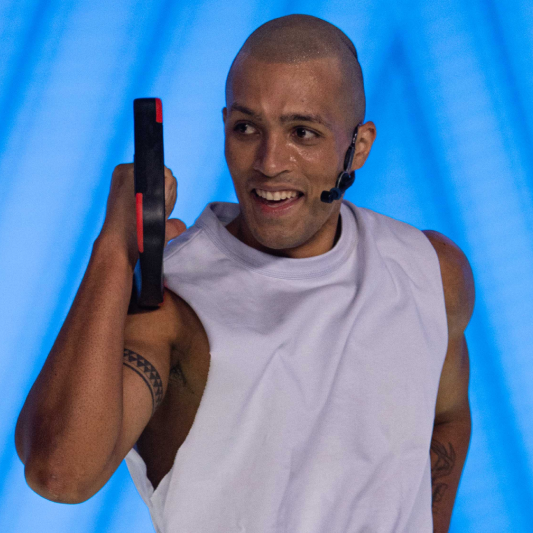
Otto Prodan: hot yoga
I started doing yoga two years ago because I wasn’t able to hit the proper range of motion for some exercises when I was weight training; I knew I had to improve my mobility. Yoga has really helped me recover faster from my training. It also helped me build more awareness around alignment and posture when exercising – which is fundamental for safety, helping me prevent injuries when lifting weights. I now practice yoga 5-6 times a week, as well as holding static stretches after my classes.
I have an active recovery day on the Wednesday (I still do yoga and a LES MILLS CORE™ class) and a full rest day Sunday (I don’t do anything apart from a 20 – 30-minute slow walk).
I’m OK skipping a workout if my body doesn’t feel like moving a certain way. Let’s say my glutes are tight – I will then avoid doing a heavy squat. That was a hard thing for me to learn, because I’m super active. I’ve learned to pivot and adapt or modify exercises so my body always feels happy moving.
I’ve learned to keep my ego in check, but I only developed this mentality once I started doing yoga.

Khiran Huston: walking
The reality is that I don’t avoid burnout. I work really long hours, this is just the nature of my “day job” and then I teach. I know I should be better at avoiding this, but it’s a challenge! When I get to a state of burnout, I see my physiotherapist more frequently and increase my lower-impact activities such as walking. Walking is so underrated. It helps me clear my mind and feels good for my body – there’s no pressure to max out or go fast or jump high. I walk with my husband [Vili Fifita] and it’s where we get to have undistracted conversations, which also helps me when my plate is full.
My body craves mobility and stretches, so I’ll do slow yoga or stretching daily. If I’m in a filming week or a heavy physical training week, I’ll soak in a bath with Epsom salts. I try to also get an infrared sauna in once a month (I’d do more frequently but they are expensive LOL!). I see my physio weekly for recovery maintenance, with a heavy focus on breathing and lymphatics. She also dry needles me.
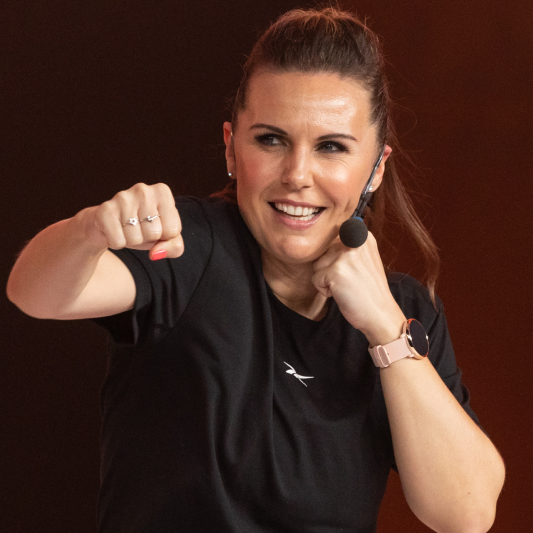
Rachael Newsham: quality over quantity
I’ve had a routine since forever: my evenings are all about magnesium, glucosamine and chondroitin. These days I have to stretch more often. For a while I incorporated a Thursday morning BODYBALANCE™ class into my schedule as my girl Sophia [Collins] was teaching, but then she left to have a baby and I haven’t returned yet either hahaha!
I wear my fitness watch all day every day and the first thing in the morning after opening my eyes is me pushing ‘yes’ to ‘already awake?’ on my watch. Then I look at the sleep score. Then I calibrate that with how I feel. Then I attack the day. If I slept rubbish, I go easier on myself. I always take a rest day on Sunday, and sometimes I have more rest days if there’s a body part that needs it.
I avoid burnout by going for quality, not quantity. Many years ago, I realized I was a far better teacher and human when I taught fewer classes, so when I’m working in Auckland I have only a handful of classes to teach. When I’m on tour it’s a different beast. I have a manager that handles my bookings and that includes what amount of presenting I do, day to day. She is very awesome – hands together for Maureen Baker!
Do you know the difference between peripheral and central fatigue? Learn more about what kind of recovery your body needs.



